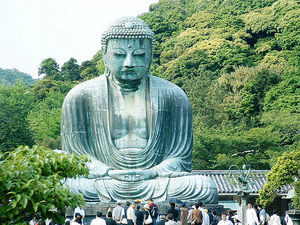Kamakura Daibutsu
- Built: 1272
- Japanese: 鎌倉大仏 (Kamakura daibutsu)
The Kamakura Daibutsu, or "Kamakura Great Buddha," is the second-largest bronze statue of the Buddha in Japan. It was constructed in 1272, of multiple pieces of bronze, and is housed at the temple of Kôtoku-in in Kamakura. The sculpture was originally located indoors, within a wooden daibutsuden, or "Great Buddha Hall," but a tsunami destroyed the hall in 1498, leaving the statue nearly completely undamaged. The 1923 Great Kantô Earthquake caused the Daibutsu to shift two feet, but then too it remained undamaged.
Visitors are allowed to enter inside the great hollow sculpture for a small fee, providing a unique view of how the sculpture was assembled. The seam where the top part and the lower part, cast separately, were then joined, is clearly visible. Also visible is a part of the inside of the neck which looks like it has been painted with clay - the result of a strengthening, a conservation effort, in 1960, using a kind of plastic or resin.
After the statue separated from its base and moved in the Great Earthquake, base-isolating quake protection was installed. No matter how great an earthquake, the statue will now never fall off its base, or fall over.
It is the first Japanese Cultural Property to be repaired using plastic, and to have this type of base-isolating quake protection installed.
References
- Plaques and signs on-site.
